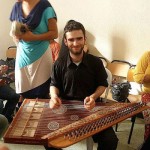Column Name
Title
When I signed the contract for a two-week residency in Tunisia this summer with the nonprofit organization Cultures in Harmony, I knew I would learn a lot. What I didn’t expect was to be quite as close to musical controversy as I was. The antisecular political party that took control after the Tunisian revolution last year believes that music should be outlawed.
Body
Cultures in Harmony, which was founded by William Harvey (’02, violin, composition; M.M. ’06, violin), aims to bring people of different cultures together through music. We taught private lessons and chamber music, led discussions about the importance of music to individuals and to society, and collaborated with traditional Arabic musicians. We were well-received by all the musicians we met, and we’ve kept in touch with many of them through e-mail and Facebook. Our presence was not understood and accepted by everyone, though. In the small village of Beni Metir, members of the antisecular Salafist political party threatened our female students for dancing and wearing clothes that they considered to be too revealing. In the city of Beja, our joint performance with students from Beni Metir and Beja had to be relocated because of a group that was protesting our presence there.
In Beja, my friend Kayleigh and I led a workshop for two violinists—a 10-year-old boy named Ahmed and a 7-year-old girl named Leila. Neither understood much English at all, and Leila in particular was very shy. We started the workshop by imitating sounds that we could each make on our instruments. A smoothly bowed open D, finger taps on the front of the instrument, and horsehair-scratching passed around the room. Leila executed each sound with as little movement as possible and moved her eyes from her violin to us suspiciously after each new sound. Next we took turns being the conductor of the group, and then closed our eyes, improvising together and imitating the sounds we heard each other make. Leila slowly opened up and eventually actively contributed a combination of glissandos and finger taps to our group improvisation.
It was well over 100 degrees in the small room so we decided to take a water break. Kayleigh asked Leila if she had a favorite Arabic song—she did—and if she would sing a little bit of it for us, but Leila shrunk into herself and wouldn’t answer. As I walked to the other side of the room to refill my glass, though, I heard something. I turned around and realized that, with her hands folded and facing a wall, Leila had started singing. She stood and sang the song from beginning to end. She was singing to herself, yet in a way that invited each of us into her world for a few minutes. Opening up at that moment was a breakthrough for her.
A few days before this workshop, we led a group discussion with Tunisian classical musicians on the role of music in their society today. After last year’s revolution, many worry that the country’s social progress is being reversed. When asked what role music has in Tunisian society, 17-year-old pianist Fairouz said that “music is pure, and we need to use it to take a break from all of the events going on around us.” Flutist Rabeb, 23, added that “playing music shows that we are moving forward with change for the better in Tunisia.”
I happened to be writing this article in September as the U.S. embassy in Tunis was attacked by antisecular protesters. Thinking back to Leila’s singing that day in Beja, I hoped it wasn’t just a personal breakthrough but a true symbol of moving forward.





